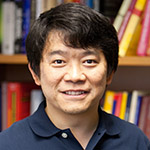Jung-Tsung Shen, PhD, assistant professor of electrical and systems engineering in the School of Engineering & Applied Science at Washington University in St. Louis, has won a prestigious Faculty Early Career Development Award (CAREER) from the National Science Foundation.

The awards support junior faculty who model the role of teacher-scholars through outstanding research, excellent education and the integration of education and research within the context of the mission of their organizations. Nineteen Washington University faculty have received CAREER awards.
Shen, the Das Family Distinguished Career Development Assistant Professor, received a five-year, $400,000 grant to study the mechanisms for enhancing optical nonlinearity in subwavelength metallic nanostructures.
Results of the research will benefit optical science, providing mechanisms to enhance and tailor the optical nonlinearity to create multi-functional nonlinear optical materials that will have potential applications for ultracompact optoelectronics, ultra-fast telecommunications, and high-resolution optical imaging beyond the diffraction limit.
The nanostructures Shen studies are artificially engineered materials, called metamaterials, that have extraordinary optical properties. Metamaterials are a new class of manmade structures that exhibit exceptional optical properties not easily observed in nature. Specifically, Shen has devised a class of nanostructured metamaterial that can enhance the optical nonlinearity by orders of magnitude.
The structure consists of a series of metal strips stacked somewhat like the slats of a Venetian blind, but with a much smaller spacing. The structure can focus the incident light beam to propagate through the very narrow channels between the metal strips so that strongly confined electromagnetic energy can be created in the channels.
By placing normal (but weak) nonlinear materials, such as silicon, germanium or copper chloride, in the channels, Shen showed that the optical nonlinearity of the structures is greatly enhanced.
Metamaterials with enhanced optical nonlinearity enable remarkable optical phenomena, such as efficient changing the color of incoming light, or using a light beam to switch on/off of another light beam.
“Metamaterials with strong optical nonlinearity could do wonders such as transforming incoming red laser light to green color,” Shen says. “We’re coming up with artificially engineered materials that have extraordinary optical responses. This can enable shrinking the size of present optoelectronic devices, for instance, and making possible energy-efficient optical devices. Moreover, such a new class of structures could also provide a way to control light in a ultrafast manner — a capability that is crucial for future demands for broadband communication and signal processing.”